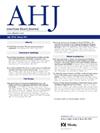阻塞性睡眠呼吸暂停对心脏移植受者长期心血管预后的影响:回顾性数据库研究
IF 3.5
2区 医学
Q1 CARDIAC & CARDIOVASCULAR SYSTEMS
引用次数: 0
摘要
背景:阻塞性睡眠呼吸暂停(OSA)常见于心血管患者,但其对心脏移植受者的影响尚未完全明确。本研究旨在比较心脏移植受者有无OSA的心血管结局。方法采用TriNetX全球协作网络进行回顾性队列研究。对接受心脏移植的成年患者(18-90岁)进行OSA诊断分层。在人口统计学和合并症的倾向评分匹配后,分析了7486名患者的队列。主要结局为全因死亡率。次要结局包括5年随访期间的心血管并发症。结果OSA心脏移植受者的全因死亡率与非OSA心脏移植受者无显著性差异(20.0% vs 19.0%; HR 1.004, 95% CI 0.934-1.080; p=0.908)。然而,OSA与心源性休克(8.5% vs 6.2%; HR 1.303, 95% CI 1.130-1.502; p<0.001)、心力衰竭(32.2% vs 21.8%; HR 1.438, 95% CI 1.281-1.614; p<0.001)、室性心动过速(9.3% vs 6.7%; HR 1.335, 95% CI 1.159-1.537; p<0.001)、房颤(14.3% vs 11.7%; HR 1.161, 95% CI 1.032-1.306; p=0.013)和肺动脉高压(17.4% vs 12.0%; HR 1.399, 95% CI 1.255-1.560; p<0.001)相关。结论在心脏移植受者中,尽管死亡率相似,但OSA与心血管并发症的风险显著升高相关。这些发现表明,在心脏移植受者的综合护理中应考虑筛查和治疗阻塞性睡眠呼吸暂停。本文章由计算机程序翻译,如有差异,请以英文原文为准。
Influence of Obstructive Sleep Apnea on Long-Term Cardiovascular Outcomes in Heart Transplant Recipients: A Retrospective Database Study
Background
Obstructive sleep apnea (OSA) is commonly observed in cardiovascular patients, but its impact on heart transplant recipients remains incompletely characterized. This study aimed to compare cardiovascular outcomes between heart transplant recipients with and without OSA.
Methods
We performed a retrospective cohort study using the TriNetX Global Collaborative Network. Adult patients (18-90 years) with heart transplant status were stratified by OSA diagnosis. After propensity score matching for demographics and comorbidities, cohorts of 7,486 patients each were analyzed. Primary outcome was all-cause mortality. Secondary outcomes included cardiovascular complications over a five-year follow-up period.
Results
Heart transplant recipients with OSA demonstrated no significant difference in all-cause mortality compared to those without OSA (20.0% vs 19.0%; HR 1.004, 95% CI 0.934-1.080; p=0.908). However, OSA was associated with significantly higher risk of cardiogenic shock (8.5% vs 6.2%; HR 1.303, 95% CI 1.130-1.502; p<0.001), heart failure (32.2% vs 21.8%; HR 1.438, 95% CI 1.281-1.614; p<0.001), ventricular tachycardia (9.3% vs 6.7%; HR 1.335, 95% CI 1.159-1.537; p<0.001), atrial fibrillation (14.3% vs 11.7%; HR 1.161, 95% CI 1.032-1.306; p=0.013), and pulmonary hypertension (17.4% vs 12.0%; HR 1.399, 95% CI 1.255-1.560; p<0.001).
Conclusion
In heart transplant recipients, OSA is associated with significantly higher risk of cardiovascular complications despite similar mortality rates. These findings suggest that screening for and treating OSA should be considered in the comprehensive care of heart transplant recipients.
求助全文
通过发布文献求助,成功后即可免费获取论文全文。
去求助
来源期刊

American heart journal
医学-心血管系统
CiteScore
8.20
自引率
2.10%
发文量
214
审稿时长
38 days
期刊介绍:
The American Heart Journal will consider for publication suitable articles on topics pertaining to the broad discipline of cardiovascular disease. Our goal is to provide the reader primary investigation, scholarly review, and opinion concerning the practice of cardiovascular medicine. We especially encourage submission of 3 types of reports that are not frequently seen in cardiovascular journals: negative clinical studies, reports on study designs, and studies involving the organization of medical care. The Journal does not accept individual case reports or original articles involving bench laboratory or animal research.
 求助内容:
求助内容: 应助结果提醒方式:
应助结果提醒方式:


